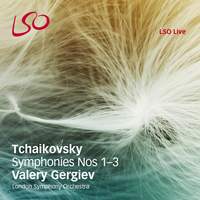Recording of the Week,
Tchaikovsky’s Early Symphonies
If, like me, you’re very familiar with Tchaikovsky’s Fourth, Fifth, and Sixth symphonies, but have not really listened very much to the others, then you’ll be as pleased as I was to be able to rectify that, with a new set of the first three symphonies, conducted by Valery Gergiev and due out next Monday on LSO Live. Gergiev has recorded the latter three more than once (including a recent, musically-excellent live DVD with the Mariinsky Orchestra), but as far as I know this is the first time he has committed the earlier three to disc.

The real delight for me has been to get to know the First Symphony. Completed when Tchaikovsky was twenty-six but not performed in its entirety until over a year later, it is subtitled Winter Daydreams, and is his first major composition. There’s some ravishing playing here from the strings and solo oboe in the slow movement and (as one would expect from the LSO) thrilling brass moments throughout the work. Gergiev brings such a lightness and deftness of touch to the third movement in particular that I was convinced I was listening to a long-lost Dvořák symphony. It really is a fine piece that deserves to be heard much more often!
Similarly, the very opening of the Second Symphony has some wonderfully poised and elegant solos from horn and bassoon. The melody of these solos is apparently an old Ukrainian folksong, one of three quoted by Tchaikovsky and thereby giving rise to the symphony’s nickname of Little Russian (Ukraine was at that time frequently referred to as Little Russia). It also has an extremely jolly ending, with an amusingly chirpy piccolo solo and a dramatic tam-tam stroke before the final breathless gallop to the finishing post!
While I was doing my research for this newsletter, I noticed that critical consensus seems to rate the Third Symphony as the weakest of the lot. Somewhat tenuously nicknamed The Polish because of the use of polonaise rhythms in the last movement, it has a slightly unusual structure, with five movements rather than the more traditional four. I definitely felt when listening to it that on the whole it is less interesting than the others (no doubt many will disagree with me, but I thought that the long first movement could have done with some judicious pruning, as in my view the quality of the material doesn’t quite justify the length).
Having said that, the playing is so committed and expressive that I can’t imagine a better account than the one given here by the LSO, and I must admit I am rather fond of the fourth movement: a fast-paced, virtuosic scherzo, with strident trombone solos, dashing violins, and swirling, mercurial flutes and clarinets. The last movement is pretty exciting too, and to be fair does provide a satisfying conclusion to the piece.
Throughout all three works, I kept hearing phrases that reminded me of passages in the later symphonies, as well as other Tchaikovsky pieces (especially the opening of the last movement of the Second Symphony, which sounded as if it could have come straight out of the 1812 Overture!). I mean this not as a criticism, but rather to demonstrate that even in these earlier works there are already flashes of the composer’s distinctive style. These recordings make about as persuasive a case as one could hope for, and have really made me wonder how I could have overlooked these pieces for so long!
London Symphony Orchestra, Valery Gergiev
Available Formats: 2 SACDs, MP3, FLAC, Hi-Res FLAC



